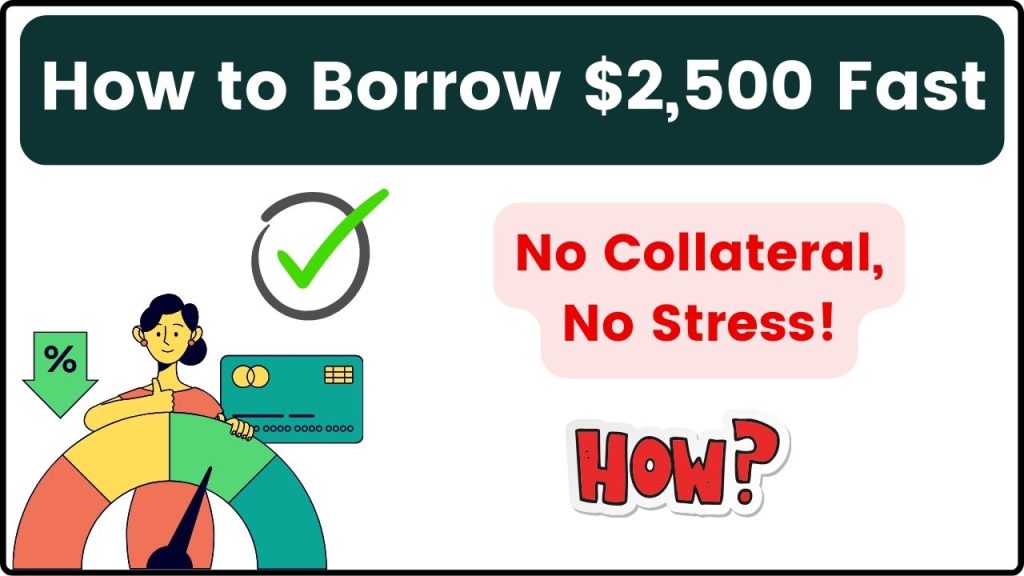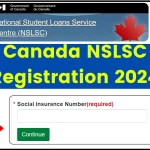How to Borrow $2500 Fast: Finding yourself in need of $2,500 quickly can be stressful, but the process doesn’t have to be. Whether it’s to cover emergency expenses, medical bills, or a home repair, borrowing money without collateral is entirely possible with the right approach. This guide will help you navigate the options and steps to secure a $2,500 personal loan quickly, without unnecessary stress or complications. By following these straightforward steps and using insider tips, you can find the funds you need with confidence, even if you’re new to personal loans.
How to Borrow $2500 Fast?
Borrowing $2,500 without collateral is straightforward if you follow the right steps. By checking your credit score, preparing documents, and choosing the right lender, you can secure a loan quickly and with minimal stress. Always review terms carefully to avoid hidden fees and ensure the repayment plan fits your budget.

| Key Information | Details |
|---|---|
| Loan Amount | $2,500 |
| Approval Timeframe | 24-72 hours |
| Eligibility Requirements | No collateral needed, proof of income, and government-issued ID |
| Interest Rates | Varies based on credit score, typically 10% to 36% APR |
| Types of Lenders | Online lenders, credit unions, and alternative financial institutions |
| Repayment Terms | 12 months to 5 years |
| Official Resource | Visit CFPB for loan regulations and consumer protections. |
Why Consider a Personal Loan for $2500?
A personal loan is one of the easiest ways to borrow money without putting your assets at risk. With predictable repayment schedules and flexible terms, it’s a practical option for covering unexpected expenses.
Advantages of Personal Loans:
- Unsecured Borrowing: No need for collateral, such as a car or home.
- Fast Access to Funds: Many lenders provide funds within 24-72 hours.
- Flexible Use: Use the loan for virtually any purpose, from consolidating debt to handling emergencies.
How to Borrow $2500 Fast Without Collateral?
Here’s how you can successfully borrow $2500 quickly and stress-free:
Step 1: Check Your Credit Score
Your credit score plays a key role in determining your eligibility and loan terms. Understanding your score can help you find the right lenders and improve your chances of approval.
Credit Score Ranges:
- Good Credit (670+): You’ll likely qualify for lower interest rates and better terms.
- Fair Credit (580-669): Approval is possible, but with slightly higher interest rates.
- Poor Credit (<580): Consider lenders specializing in bad-credit loans.
How to Check Your Credit Score:
- Use platforms like Credit Karma or AnnualCreditReport.com.
- Dispute errors on your credit report to boost your score before applying.
Step 2: Compare Lenders for No-Collateral Loans
Not all lenders offer unsecured loans, so it’s essential to find those that specialize in this type of financing.
1. Online Lenders
Online lenders like SoFi, Upstart, and LendingClub provide quick approvals and often deposit funds within 24 hours.
2. Credit Unions
Credit unions typically offer lower interest rates, even for unsecured loans, but may require membership.
3. Alternative Lenders
Options like OppLoans or NetCredit cater to individuals with less-than-perfect credit and provide fast disbursements.
Step 3: Prepare the Necessary Documents
Having the right documents ready will expedite your loan approval process. Most lenders require:
- Government ID: A driver’s license, passport, or other valid identification.
- Proof of Income: Recent pay stubs, tax returns, or bank statements.
- Bank Account Information: For direct deposit of funds.
- Employer Contact Details: For verification purposes.
Step 4: Pre-Qualify to Check Your Eligibility
Many lenders offer a pre-qualification process that doesn’t affect your credit score. This allows you to compare loan terms and interest rates before committing.
Step 5: Submit a Complete Loan Application
Ensure your loan application is accurate and fully completed. Mistakes or missing information can delay the approval process.
Step 6: Respond Quickly to Lender Requests
If your lender requests additional documentation or clarification, respond promptly to avoid delays in processing your loan.
Step 7: Review the Loan Terms Before Accepting
Carefully read the loan agreement to avoid hidden fees and ensure you’re comfortable with the repayment terms. Pay attention to:
- Interest Rate (APR): Verify it’s competitive for your credit score.
- Repayment Period: Make sure the monthly payments are manageable.
- Fees: Look out for origination fees, late payment charges, or prepayment penalties.
Hacks to Boost Your Approval Chances
1. Apply With a Co-Signer
A co-signer with a stronger credit score can improve your odds of approval and secure a lower interest rate.
2. Highlight Stable Income
Demonstrate consistent income to reassure lenders of your ability to repay the loan.
3. Lower Your Debt-to-Income Ratio
Pay off smaller debts to improve your debt-to-income (DTI) ratio, which lenders prefer to be below 40%.
Alternatives to Personal Loans
If a personal loan isn’t the right fit, consider these options:
1. Credit Card Cash Advance
While not ideal due to high fees, a cash advance can provide immediate funds if you already have a credit card.
2. Borrowing From Friends or Family
This can be a low-cost option, but it’s important to set clear repayment terms to maintain good relationships.
3. Payday Loans
Payday loans are fast but come with exorbitantly high interest rates. Use this option only as a last resort.
This One Trick Will Help You Secure a $1,000 Personal Loan Fast!
Get a Personal Loan for $20,000 With These Insider Tips
How to Secure a Personal Loan Up to $35,000 – No Collateral Required
Frequently Asked Questions (FAQs)
1. Can I get a $2,500 loan with bad credit?
Yes, many lenders offer unsecured loans for individuals with bad credit, though interest rates will likely be higher.
2. How quickly can I get the funds?
Most online lenders and alternative institutions disburse funds within 24-72 hours after approval.
3. What fees should I watch out for?
- Origination Fees: 1-8% of the loan amount.
- Late Payment Fees: Charged if you miss a due date.
- Prepayment Penalties: Some lenders charge for paying off the loan early.
4. Does pre-qualification affect my credit score?
No, pre-qualification involves a soft inquiry and won’t impact your credit score.
Real-Life Example: How Alex Borrowed $2,500 Stress-Free
Alex, a small business owner, needed $2,500 to purchase inventory for a seasonal rush. Here’s how he did it:
- Checked his credit score: 640, which qualified him for fair-credit loans.
- Selected an online lender: Opted for Upstart for its fast approval process.
- Submitted necessary documents: Uploaded his tax returns and bank details.
- Received funds in 48 hours: The money was deposited directly into his account, enabling him to restock on time.
Alex’s proactive approach ensured he secured the funds without stress.






